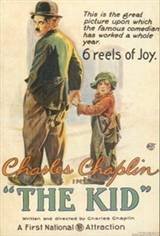The Kid (Chaplin)

The Kid was Charles Chaplin's first self-produced and directed feature film; 1914's 6-reel Tillie's Punctured Romance was a Mack Sennett production in which Chaplin merely co-starred.The story with a smile and perhaps a tear, begins with unwed mother Edna Purviance leaving the Charity Hospital, babe in arms.
Her burden is illustrated with a title card showing Christ bearing the cross. The father of the child is a poor artist who cares little for of his former lover, carelessly knocking her photo into his garret fireplace and cooly returning it there when he sees it is too badly damaged to keep.
The mother sorrowfully leaves her baby in the back seat of a millionaire's limousine, with a note imploring whoever finds it to care for and love the child. But thieves steal the limo, and, upon discovering the baby, ditch the tot in an alleyway trash can.
Enter Chaplin, out for his morning stroll, carefully selecting a choice cigarette butt from his well used tin. He stumbles upon the squalling infant and, after trying to palm it off on a lady with another baby in a carriage, decides to adopt the kid himself.
Meanwhile Purviance has relented, but when she returns to the mansion and is told that the car has been stolen, she collapses in despair. Chaplin outfits his flat for the baby as best he can, using an old coffee pot with a nipple on the spout as a baby bottle and a cane chair with the seat cut out as a potty seat.
Chaplin's attic apartment is a representation of the garret he had shared with his mother and brother in London, just as the slum neighborhood is a recreation of the ones he knew as a boy.Five years later, Chaplin has become a glazier, while his adopted son (the remarkable Jackie Coogan) drums up business for his old man by cheerfully breaking windows in the neighborhood.
Purviance meanwhile has become a world famous opera singer, still haunted by the memory of her child, who does charity work in the very slums in which he now lives. Ironically, she gives a toy dog to little Coogan.
Chaplin and Coogan's close calls with the law and fights with street toughs are easily overcome, but when Coogan falls ill, the attending doctor learns of the illegal adoption and summons the Orphan Asylum social workers who try to separate Chaplin from his foster son.
In one of the most moving scenes in all of Chaplin's films, Chaplin and Coogan try to fight the officials, but Chaplin is subdued by the cop they have summoned. Coogan is roughly thrown into the back of the Asylum van, pleading to the welfare official and to God not to be separated from his father.
Chaplin, freeing himself from the cop, pursues the orphanage van over the rooftops and, descending into the back of the truck, dispatches the official and tearfully reunites with his son. Returning to check on the sick boy, Purviance encounters the doctor and is shown the note which she had attached to her baby five years earlier.
Chaplin and Coogan, not daring to return home, settle in a flophouse for the night. The proprietor sees a newspaper ad offering a reward for Coogan's return and kidnaps the sleeping boy.
After hunting fruitlessly, a grieving Chaplin falls asleep on his tenement doorstep and dreams that he has been reunited with the boy in Heaven (that flirtatious angel is Lita Grey, later Chaplin's second wife). Woken from his dream by the cop, he is taken via limousine to Purviance's mansion where he is welcomed by Coogan and Purviance, presumably to stay.
Chaplin had difficulties getting The Kid produced. His inspiration, it is suggested was the death of his own first son, Norman Spencer Chaplin a few days after birth in 1919. His determination to make a serio-comic feature was challenged by First National who preferred two reel films, which were more quickly produced and released.
Chaplin wisely gained his distributors' approval by inviting them to the studio, where he trotted out the delightful Coogan to entertain them. Chaplin's divorce case from his first wife Mildred Harris also played a part; fearing seizure of the negatives Chaplin and crew escaped to Salt Lake City and later to New York to complete the editing of the film.
Chaplin's excellent and moving score for The Kid was composed in 1971 for a theatrical re-release, but used themes that Chaplin had composed in 1921. Chaplin re-edited the film somewhat for the re-release, cutting scenes that he felt were overly sentimental, such as Purviance's observing of a May-December wedding and her portrayal as a saint, outlined by a church's stained glass window.
| Director: | Charles Chaplin |
